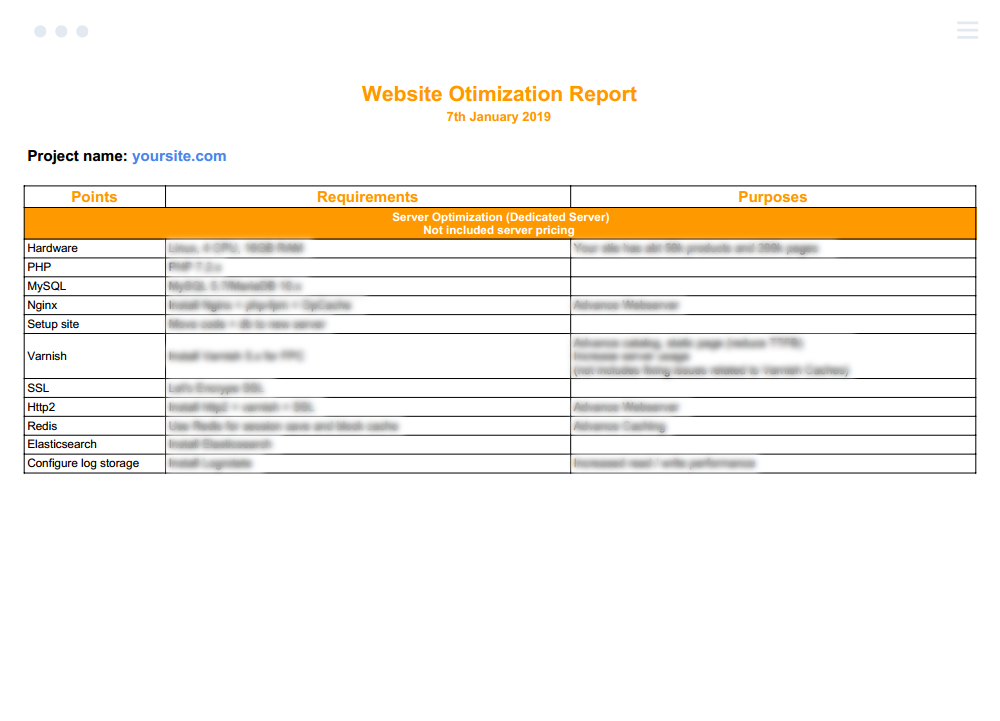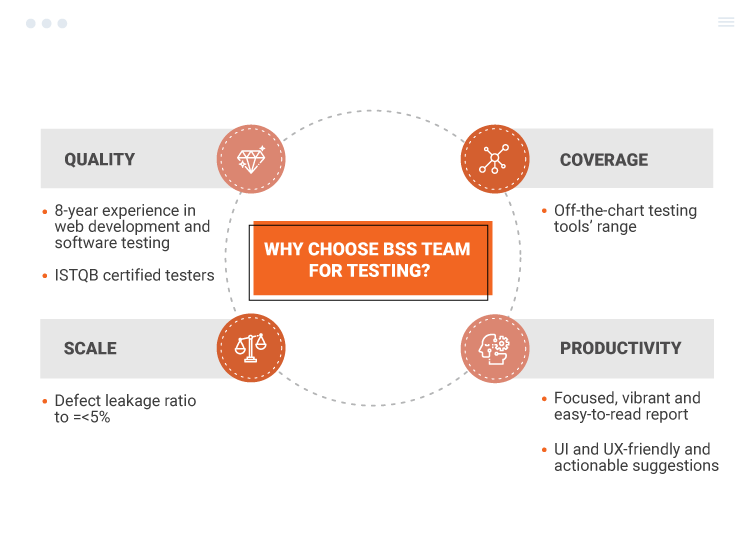Ecommerce website testing: How to make it effective to not miss any problem that annoys users?
Flawless ecommerce experience is one of the key pillars for online businesses’ efforts to gain market share. Even when quality and prices are competitive, silly pain points in user experience can hurt conversions. Ecommerce website testing, accordingly, is necessary to make sure an online store works appropriately.
However, a sketchy test may not be enough to uncover all issues. Stay in the post to get useful notes and tips to help you conduct ecommerce web testing effectively.
Was Your Ecommerce Website Really Tested When Needed?
Table of Contents

Before discussing how to test an ecommerce website effectively, let’s ensure that you give it some tests when needed. If you think that this task is necessary only after the development process finishes, you are wrong!
Even when your website has been launched for a while, it still needs to be tested in many cases. Here are some examples:
- It reveals abnormal signs (e.g., login pop-up does not display as configured)
- It just has been upgraded or migrated from another platform
- It just has been optimized or re-designed
- Even when there’s no problem exposed outside, the tests will help discover potential or hidden issues that may annoy customers
In general, this is a beneficial activity whenever you’ve made any substantial changes on your site or find on it abnormal signs.
What Factors Make Effective Ecommerce Website Testing
Effectiveness comes after sufficiency. Below, we’ve gathered the most critical points that store owners and testers should note to take every test to the expected results.
Specify areas and objectives before testing
Obviously, choosing a specific area is the very first step of ecommerce website testing. As the term covers various aspects (e.g., performance, usability, security, etc.), this step allows testers to define the driver for actions and then specify which areas should be tested under which test cases.
As soon as the objectives are specified, you can create a web testing checklist template containing details like the date of the test, sections, test steps, testing results, etc.

GET STARTED with The Ultimate Guide to Writing Test Cases for Ecommerce Websites to create a usability web testing checklist template and write test cases.
Do not skip any possible scenario
Whatever aspect of your website ecommerce you test, it’s important to try as many scenarios as possible. It means that you should not skip any cases in which customers may interact with your website to understand what can happen under their actions.
For example, you must check these scenarios when testing the shopping basket functionality:
- Add products to the basket
- Remove products from the basket
- Change the quantity of products in the basket
- Select delivery options
- Check VAT and delivery costs add up correctly
By following this rule, you can be confident to deliver a flawless online shopping experience if the test reveals expected results.
On the other hand, if your test does cover not enough scenarios, it can be considered a sketchy and ineffective test.
Follow ecommerce website testing checklist closely
Each aspect of an ecommerce website may relate to a lot of details and features. Let’s talk about mobile devices compatibility tests for an example. You include many devices on the checklist (e.g., iPhone, iPad, Android smartphones, Android tablets, etc.).
Following the ecommerce website testing checklist closely helps testers not to miss any detail/feature that needs to be tested.
Set up a proper test environment
The test environment contributes a great impact on the final result of a test. Setting up the test environment requires testers to be smart and have expertise in this area.
It is recommended to choose only one objective to test at a time. If you do the opposite, the test may sometimes give back inexact results, which is not an appropriate practice.
The test team is experienced and professional in ecommerce web testing
Last but not least, the tester who takes over the tests is required to have general testing skills and experience in ecommerce website testing.
Why is that so? He or she has a good basis and understanding of the way ecommerce websites should look and will know how they should perform in different cases. The practices of previous works help testers not to miss details to be tested and test them under various cases.
Key Aspects May Be Covered While Testing An Ecommerce Website
Besides the mentioned points, testing an ecommerce website should cover the following critical areas to evaluate the overall website. Please note that this is not really an ecommerce website testing checklist, but a list of important aspects should be covered.
Website usability
The usability of a website or application refers to how easy it is to use. The tests are conducted to measure how usable or intuitive a website is and how easy it is for users to achieve their objectives. The test’s goal is to uncover areas of confusion and then get the roadmap to enhance the overall user experience.
By testing the ecommerce website’s usability (also called functional testing), you can check its user-friendliness to make sure that visitors can understand and navigate the website without any difficulty. The navigation is also tested to know if visitors can surf the different pages of the website with ease. Meanwhile, readability is another aspect of the test to ensure the intended users can make sense of the content and images on the website.
If you are curious about how a usability testing report looks like, have a quick look at this example:

ASK Ecommerce Web Testing On-Demand expert if you don’t know how to perform in-depth usability testing.
Website performance
In general, website performance refers to the web loading speed in which a web page is displayed on users’ web browsers. This term also involves web stress, smoothness, and interactivity that visitors experience when they land on a page.
Low page speed is one of the most annoying reasons making online shoppers abandon a website. Performance testing, for that reason, is a critical activity that store owners and testers should not skip.
When the test finishes, you can measure how your website handles bulk loads and multiple user requests. Besides, the web stress testing allows you to evaluate the site’s response towards stress and its ability to recover from crashes.
For ecommerce websites using Magento 2, Magento 2 Speed-Up Consulting Package will help store owners test the Magento page speed and send back to you optimal solutions to accelerate it.

User interface
Along with usability and performance, User Interface is another pivotal aspect that reflects a good or bad user experience in the storefront. User Interface includes all the graphics, information, and tools displayed on the screen when users open and surf a web page. Those elements decide the navigability and the way users interact with the page.
The web server, application server, and database server interface are the important things that need to be checked to ensure compatibility between different servers to improve interaction and error handling.
Compatibility
Indeed, compatibility between elements within a website or between a website and an environment is the initial condition so that they can work appropriately together. Hence, there are several things that need to be tested in terms of compatibility, including the operating system, and browser.
Chrome, Firefox, Internet Explorer, Opera, or Netscape Navigator are the most popular browsers with a large number of users. Therefore, don’t forget to review if your online store works well with these browsers or has missed several valuable accesses.
Additionally, store owners and testers should also pay more attention to mobile browser compatibility. According to conducted statistics, ecommerce websites that can run smoothly on mobile devices will have a greater opportunity to grow due to the increase of mobile users.
To win higher positions in search engine result pages, it’s essential to check whether your SEO elements, including URL structure, title tags, image alt tags, meta descriptions, etc. are implemented with the best practices.
IMPROVE SEO PRACTICE with Magento SEO Checklist to get 20+ notes and tips that couldn’t be missed!
Security
For online businesses, data leakage or data loss is the worst incident because your business secrets and valuable database may disappear in the blink of an eye. What would happen if a business accidentally loses customer information, which is the blood to fulfill orders and keep the business alive?
Security, therefore, is another aspect that store owners need to pay special attention to uncover the potential vulnerabilities and fix found issues. In this way, you can prevent possible attacks and maintain the website’s integrity to ensure the highest security level for your database.
Responsiveness across devices
Consumers tend to be more active in the online environment in any condition. Therefore, they may want to access a website from different devices without any difficulty. Responsiveness allows visitors to view a website as what it is designed across devices. If you skip this point in ecommerce website testing, your store may have missed many customers and you didn’t know that.
Notably, online businesses should pay more attention to user experience on mobile devices when users tend to spend more time on those. Don’t let the unresponsiveness hurt your potential market share.
Bottom Lines
The notes mentioned in this post are not all, but understanding their importance and practicing properly will be key points to conduct effective ecommerce website testing.
Once again, don’t forget that BSS Commerce has certified developers and experienced testers to give you a hand in the field of ecommerce. CONTACT US NOW to share your testing requests.
>> DISCOVER our full Website Development Services now!

